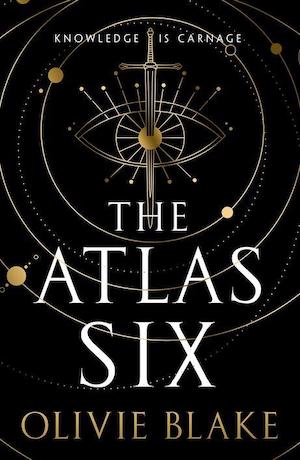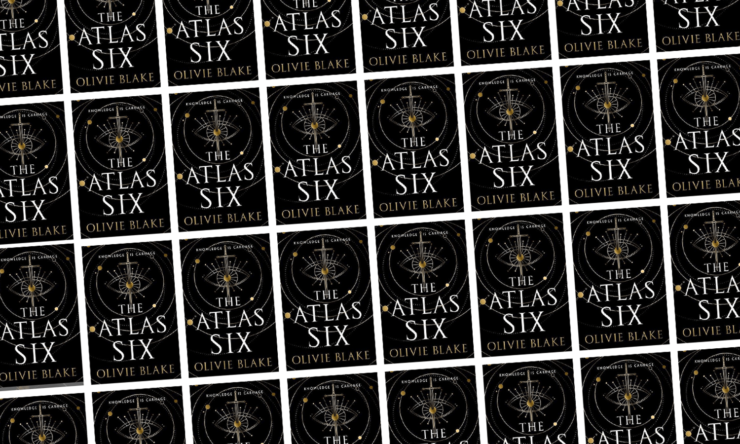It’s not a common thing to pick up a book for review knowing that it’s already popular. But Olivie Blake’s The Atlas Six came in on a tide of news: the millions of views of #TheAtlasSix and similar hashtags on TikTok; the seven-way bidding war for its “traditional” publication; the fact that it was picked up for adaptation before the new version even arrived on shelves. Your average book may arrive with some early praise, but no matter how much a new book is hyped, a publisher can’t make it genuinely popular before it exists. This book, in some ways, is a unicorn—not the only one of its kind, but a rare creature, the sort of thing where I want to understand exactly how it came into being.
The Atlas Six tells the story of six extremely talented magicians picked to live in a house (sorry, yes, that was a Real World joke) chosen to earn a place in the secretive Alexandrian Society. For one year, these elite magicians (called medeians) live at Society’s headquarters, studying and learning together, summoning books from the incredible library (Alexandria as in “Library of,” though it’s just part of the collection) and seeing how their powers work together. At the end of that year, they’ll learn much more about the power Society membership grants—and the true cost of initiation.
The recruits are very different, though generally all young and attractive (and more or less aware of their attractiveness). Three work on the physical side of magic, playing with energy or fire or plants; three muck about with people’s minds. Libby and Nico, college frenemies turned bickering magical peers, can do astonishing things when they combine their powers. Libby is the book’s moral compass, the one most likely to fret over anything and everything; Nico is one of those floppy oblivious boys who does whatever he wants. One of the things he wants is often to look out for his roommate, Gideon, who has unusual parents and even less common skills. (The Nico/Gideon relationship has echoes of Gansey and Ronan from The Raven Boys, though Gideon is, well, a lot nicer.)
Reina has a sharp observational eye and communicates with plants, who whisper MotherMotherMother! when she comes near. Her opposite, Parisa, is keyed into what people think: she’s a stunningly beautiful telepath who sees her looks as just one more tool in her arsenal, and whose archness and attitude conceal a painful backstory (if another character’s interpretation of it is to be trusted, anyway).
Buy the Book


The Atlas Six
Tristan, the son of a crime lord, has a chip on his shoulder and can see through illusions, but has not yet tapped into his full potential. Aloof Callum comes from a highly regarded family of illusionists and is absolutely unbearable. To be fair, by the end of the book he has some decent reasons for being the worst.
The six magicians are diverse in background, nationality, and sexual interests; some that don’t hook up in this first volume give the distinct impression that they still might. There’s also Atlas Blakely, who recruits the medeians, and Dalton Ellery, a member of the last class of recruits who is oddly still working at the society, not out in the world enjoying the power and advantages membership supposedly grants.
Parisa immediately twigs that there’s something interesting about Dalton, and she’s not wrong, though it is hard to go into detail on that front without verging into spoiler territory. (What counts as a spoiler when the book has previously been out for two years?) He’s older, he’s anxious and tense, he has an unusual magical talent, and something very peculiar is going on in his head.
For much of the novel, the medians flirt and bicker and study and request books from the library, which often denies their more personal requests. (The library itself is also a very intriguing character, if one we’ve barely seen yet.) As they nudge each other into better understanding their skillsets, Blake weaves their skills and personalities into a complicated mesh of alliance and suspicion and different kinds of attraction and curiosity. You’re going to have favorites, and everyone’s favorites will be different. (Reina is the best. Tristan is also delightful, with his blend of cynicism and potential.)
In some ways, these medeians put me in mind of the students of Lev Grossman’s The Magicians, though more the series version than the books. (The Secret History has been referenced in comparison to this and just about any book with a potentially deadly college-or-adjacent setting.) Rather than a looming and obvious Big Bad, they face threats and challenges from other societies, and, as the story goes on, the increasing pressure that hangs over them all. Atlas Blakely isn’t telling them everything. And trusting each other is no easy feat, either.
The strangest thing about The Atlas Six is that when I talk about it—when I think about it and read about it and search out interviews with the author—everything appeals. Give me mysterious societies with magical libraries! Give me bickering twentysomethings striving for greatness and power and debating what power means and is worth! In the two years since Blake initially self-published the book, she’s said all kinds of interesting things about it, like this long conversation in which she talks about the idea of Western colonization of information, among other things. Her characters relate to their power—magical and otherwise—in ways that are shaped by their backgrounds, their upbringings, their individual experiences with tragedy. The pieces are all there. The elements are in place. But for me, the math is off.
Partly, it’s that it feels a bit like a very long prologue. This is scene-setting and background, banter and bickering, seductions and exploration. If you click with the writing and the characters, there’s plenty to luxuriate in. But the writing is tuned to a very specific key, and it’s one that doesn’t sing for everyone. The sometimes overwrought prose is notably dialogue-heavy, and that dialogue is described with a whole army of verbs. Groaned, snarked, scoffed, prompted, cautioned, retorted, informed, demanded, echoed—I began to gently dread the long stretches of conversation, because the dialogue tags were so distracting. The way Blake details the characters’ speech begins to feel constrained, controlling, like every gesture and huff must be pointed out; it doesn’t leave much room for the characters or the reader’s imagination to breathe.
As I read, I kept feeling like I was trying to get around or past the writing to the ideas beneath, to see what the library was giving the medeians, to really understand what thrilled or terrified or encouraged them. Their world is small, and that’s intentional: they’re isolated in the society’s lavish building, pushed together in a gilded cage with only the rarest escape. At times Blake’s detailed yet confined-feeling prose neatly reflects the characters’ reality; they can’t see the full truth, and we can’t yet see the whole picture. At other times it feels like too much frosting muting the flavor of a more subtle cake.
The novel’s finale turns many things topsy-turvy with a game-changing reveal that requires a lot of explanation in this book, and probably a lot more in the next. Frustrations aside, I am curious to see how Blake pulls it off (though I remain much! more! curious about what is going on in Dalton’s head). The Atlas Six is full of ideas and concepts that—like some of the potential initiates of the Alexandrian Society—may be just dying to get out.
The Atlas Six is available from Tor Books.
Find audio clips and text excerpts from the book here.
Molly Templeton lives and writes in Oregon, and spends as much time as possible in the woods. Sometimes she talks about books on Twitter.











Please pardon the use of this post to comment, but the Atlas Six drawing post closed comments early. Entries are required by 11:59pmET today. Comments to the drawing post closed before 3pmET.